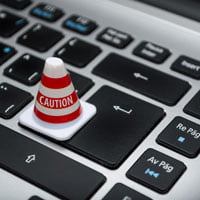
The anxiety produced by our accelerating and expanding future is causing our views of the future to contract. It’s a crazy paradox. The more we know, the less we know. The more we can know, the less we want to know. The less we can tolerate the info, the more we need to expand our reach. The more we expand our reach, the more we see boogie men. – John Sumser
At the very same time, the pace of change is accelerating. Our possible futures are exploding with possibility. The next moments could be astonishingly bright or profoundly bleak.
My social media feeds have gotten radioactive.
I fall behind when I run as fast as I can. Instead of “skating to where the puck is going to be“, I can’t get out of the locker room. Everywhere I look, I’ve missed the boat before I even figured out there was one to catch.
The anxiety produced by our accelerating and expanding future is causing our views of the future to contract. You can hear it in the repetitious views that the future somehow mostly involves complicated adding machines, predictions that cave in on themselves, out of control machines and a dystopian landscape.
It’s a crazy paradox. The more we know, the less we know. The more we can know, the less we want to know. The less we can tolerate the info, the more we need to expand our reach. The more we expand our reach, the more we see boogie men.
Crazy.
One of the surprising dangers of social media is the way it explodes the present at the expense of the past and future. Simply staying current on the comings and goings of 100 people decreases our ability to learn from the past and to see ahead in time. When that stimulus includes an overdose of politics, watch out.
Technologically, being here now reduces the control we have over events and accomplishments. Being in the moment seems to mean rapidly falling behind. The old trick of using the past to imagine the future is in complete failure
Have we crossed some sort of threshold? Is this a change is the essence of what it means to be alive, to be human? Is there anyone who isn’t experiencing this phenomenon?
If you think it’s crazy in our western cultures where technology is fluid, imagine being a worker in India or China. The standard of living is rising so rapidly that middle class expectations are erupting where abject poverty used to live. The technology we take for granted is also raising the demands of the rest of the world. And in the same breath, corruption blossoms right alongside the new found middle class luxuries.
Relatively speaking, things are moving faster further down the tiers of economic development. Revolutions, aborted uprisings, instant media, democratized communications, massive underground markets, instant copies, lightning speed envy and free information are drowning the entire human species. The waves of technology come faster in these emerging markets than they ever have in the West. In general, things are getting better for everyone.
What do you do when keeping your eye on the ball means completely losing track of the game? Is this a training ground for a new way of seeing and doing?
Until now, every now technology and epoch expanded our ability to imagine. Cars, phones, airplanes, books, literacy, space exploration, radio, television, large led video screens, agricultural technology, and religions have all changed our capacity to imagine, change and control our destinies. It seems like that’s changing. Being inundated with information forces us to narrow our timelines and constrain our imaginations.
The net result is a universe of people (particularly but hardly exclusively in HR) who can’t see the impending disruption of their lives, careers and professions. Any process that can be automated has been or will be automated. What remains is either a narrow wisdom posessed only by practitioners or minor tasks that just about anyone could do.
Unsurprisingly, practitioners are certain that what remains is their exclusive expertise. The future they imagine is more of the same only better. The future they are going to get has much, much less of the same.
HR Departments everywhere are starting to understand that much of their cost is driven by the fact that they don’t own their own data. The move to Big Data solutions will bring enormous gain to the brave and a future in the service industry to the rest. Data will be taken back by its owners (from the vendors who hold it hostage in proprietary databases).
The important skills are becoming healthy skepticism, a desire for data and the wisdom to put them together.











